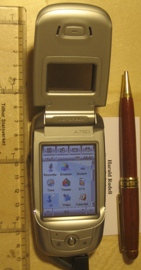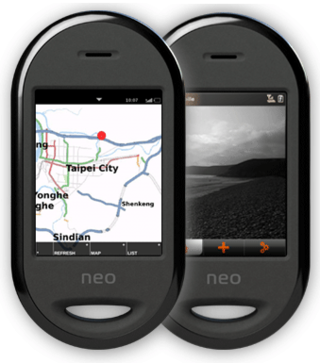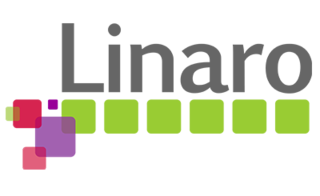
In computing, the Executable and Linkable Format, is a common standard file format for executable files, object code, shared libraries, and core dumps. First published in the specification for the application binary interface (ABI) of the Unix operating system version named System V Release 4 (SVR4), and later in the Tool Interface Standard, it was quickly accepted among different vendors of Unix systems. In 1999, it was chosen as the standard binary file format for Unix and Unix-like systems on x86 processors by the 86open project.
Qt Extended is an application platform for embedded Linux-based mobile computing devices such as personal digital assistants, video projectors and mobile phones. It was initially developed by The Qt Company, at the time known as Qt Software and a subsidiary of Nokia. When they cancelled the project the free software portion of it was forked by the community and given the name Qt Extended Improved. The QtMoko Debian-based distribution is the natural successor to these projects as continued by the efforts of the Openmoko community.

MontaVista Software is a company that develops embedded Linux system software, development tools, and related software. Its products are made for other corporations developing embedded systems such as automotive electronics, communications equipment, mobile phones, and other electronic devices and infrastructure.
The Motorola A760 is a Linux-based camera equipped mobile telephone developed at Motorola's laboratory in China and released in the Chinese market on February 16, 2003. The particular Linux distribution used was MontaVista Linux. It is the first phone to use Linux.
MotoMagx was a Linux kernel-based mobile operating system developed and launched in 2007 by Motorola to run on their mid-to-high-end mobile phones. The system was based on MontaVista's Mobilinux. Originally intended for 60% of their upcoming devices, it was soon dropped in favor of Android and Windows Mobile operating systems.
The Motorola ROKR, the first version of which was informally known as the iTunes phone, was a series of mobile phones from Motorola, part of a 4LTR line developed before the spin out of Motorola Mobility. ROKR models were released starting in September 2005 and ending in 2009. They were notable for incorporating support of media player features.

The Motorola A780 is the second cellular PDA running the Linux operating system.
In the context of free and open-source software, proprietary software only available as a binary executable is referred to as a blob or binary blob. The term usually refers to a device driver module loaded into the kernel of an open-source operating system, and is sometimes also applied to code running outside the kernel, such as system firmware images, microcode updates, or userland programs. The term blob was first used in database management systems to describe a collection of binary data stored as a single entity.
The Motorola Ming is a series of smartphones from Motorola, sold in Hong Kong and mainland China only. It is one of the series in the 4LTR line.

Openmoko is a discontinued project to create a family of open source mobile phones, including the hardware specification, the operating system, and actual smartphone development implementation like the Neo 1973 and Neo FreeRunner. The whole project was sponsored by Openmoko Inc.

The Tizen Association, formerly the LiMo Foundation, is a non-profit consortium which develops and maintains the Tizen mobile operating system. Tizen is a Linux-based operating system for smartphones and other mobile devices. The founding members were Motorola, NEC, NTT DoCoMo, Panasonic Mobile Communications, Samsung Electronics, and Vodafone. The consortium's work resulted in the LiMo Platform—which was integrated into mobile phone products from NEC, Panasonic and Samsung—and later became the Tizen platform.

The Motorola A910 is a clamshell mobile phone from Motorola, which uses MontaVista Linux as the operating system.

Linaro is an engineering organization that works on free and open-source software such as the Linux kernel, the GNU Compiler Collection (GCC), QEMU, power management, graphics and multimedia interfaces for the ARM family of instruction sets and implementations thereof as well as for the Heterogeneous System Architecture (HSA). The company provides a collaborative engineering forum for companies to share engineering resources and funding to solve common problems on ARM software. In addition to Linaro's collaborative engineering forum, Linaro also works with companies on a one-to-one basis through its Services division.

Mer was a free and open-source software distribution, targeted at hardware vendors to serve as a middleware for Linux kernel-based mobile-oriented operating systems. It is a fork of MeeGo.

Maliit is an input method framework for computers with particular focus on implementing virtual keyboards. Designed mostly for touchscreen devices, Maliit allows the inputting of text without the presence of a physical keyboard. More advanced features such as word correction and prediction are also available.
Besides the Linux distributions designed for general-purpose use on desktops and servers, distributions may be specialized for different purposes including computer architecture support, embedded systems, stability, security, localization to a specific region or language, targeting of specific user groups, support for real-time applications, or commitment to a given desktop environment. Furthermore, some distributions deliberately include only free software. As of 2015, over four hundred Linux distributions are actively developed, with about a dozen distributions being most popular for general-purpose use.

postmarketOS is an operating system primarily for smartphones, based on the Alpine Linux distribution.
Mobilinux is a discontinued Linux distribution by MontaVista. It was announced on April 25, 2005.
The Linux kernel can run on a variety of devices made by Apple, including devices where the unlocking of the bootloader is not possible with an official procedure, such as iPhones and iPads.










